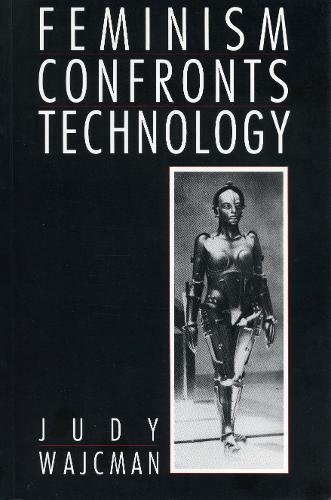Judy Wajcman: Feminism Confronts Technology (1991)
Filed under book | Tags: · feminism, gender, machine, technology, women

“Feminism Confronts Technology provides a lively and engaging exploration of the impact of technology on women’s lives from word processors to food processors, and genetic engineering to the design of cities. Comprehensive and critical, this book surveys the sociological and feminist literature on technology, highlighting the male bias in the way technology is defined as well as developed. Wajcman sets the scene with an overview of feminist theories of science and technology: encompassing the technologies of production and reproduction as well as domestic technology.
The author challenges the common assumption that technology is gender neutral, looking at whether technology can liberate women or whether the new technologies are reinforcing sexual divisions in society.”
Publisher Pennsylvania State University Press, 1991
ISBN 0271008024, 9780271008028
x+184 pages
Reviews: Ann Dugdale (Social Studies of Science), Linda Layne (Science, Technology, & Human Values), Raelene Frances (Journal of Industrial Relations), Antony Marsh (Prometheus).
PDF (26 MB, updated on 2019-10-10)
See also Wajcman’s TechnoFeminism, 2004.
Comments (2)Louis Armand, Jane Lewty, Andrew Mitchell (eds.): Pornotopias: Image, Desire, Apocalypse (2008)
Filed under book | Tags: · art, body, gender, image, masochism, pornography, sex, sexuality, theory

Bodily existence is an existence lived in constant fascination with a world beyond one’s reach. Embodiment, desire, metaphor. To exist on the verge of nonexistence. In the headlong pursuit of the real, of the other. Of the base materiality of the world, of religious hypothesis, of absolute relativity. Every utopia is a pornography, a recrudescence and pathological disillusionment, a lure into the vortex–paradoxical annulment of pure reason, compulsion, repetition, consumption.
A fact of bodily existence is to know that the body is our most complex and multi-faceted machine in a world of incessant technological progress. The body is a marvel of engineering; it is the outward face of primal nature; it is a disgusting vessel in which to house the soul; it is a primitive device, fragile and disposable. Bodies are re-produced, experimented upon to the limits of their tolerance, dissected and debated to every last cell, mended, prosthetically enhanced, moralised, abused and adored. The interface with the world we live in means that the body is always laid open to scrutiny without ever simply constituting some thing within our grasp: it is the site where violence and metaphysics interchange, technicity and catatonia, the sublime and the grotesque.
The body cannot be neutral or indifferent. Its design is such that it must respond to both exterior challenge and interior impulse. Our means of survival, the sex act, galvanizes the body into a unique state of existence, which, though transient, becomes the essence of being; the concentration of an idea, the heightening of sense, the ultimate dissolution.
How to write this purposeful transformation? How to write this instantaneous, ephemeral shattering of perception? This is the task of pornography. Our project will present the body in its most extreme of forms and behaviour, all of which demonstrate the human attempt to satisfy, and solve, the oft-inchoate needs of our psychology and physicality. We seek papers which deal with pornography as condition, symptom, addiction, spectacle, product, simulacrum. Above all as a fundamentalism embedded in the very structures of representation, knowledge, non-knowledge and the unpresentable.
Contributors include Georges Bataille, Johannes Birringer, Karmen MacKendrick, Benjamin H. Bratton, Lara Portela, Louis Armand, Stewart Home, Jane Lewty, Thierry Tillier, Ruark Lewis, Malwina Zaremba, Darren Tofts, Bonita Rhoads, Stuart Kendall, Ian Haig, Jena Jolissaint, Pierre Daguin, Vadim Erent, Florian Cramer, Beth Lazroe, Andar Nunes.
Publisher Faculty of Philosophy of the Charles University, Prague, December 2008
Litteraria Pragensia Books series
ISBN 9708073082918
272 pages
PDF (69 MB, updated on 2013-5-11)
Comments (4)Ada: A Journal of Gender, New Media, and Technology, No. 1: Conversations Across the Field (2012)
Filed under journal | Tags: · feminism, game studies, gender, new media, queer theory, technology

Ada is a feminist, multimodal, peer reviewed journal that examines the intersections of gender, new media, and technology.
Ada issues will be organized around themes and will be published twice a year. Ada is an open-access peer reviewed journal. The first issue highlights contributions from the field and is an invited issue. Subsequent issues are peer reviewed using a multi-level open peer review process.
Chief Editor: Carol Stabile
Produced by Fembot Collective, November 2012
Published and preserved through the University of Oregon Libraries
Creative Commons Attribution-NonCommercial-NoDerivs 3.0 Unported License
ISSN 2325-0496
View online (HTML)
Comment (0)
